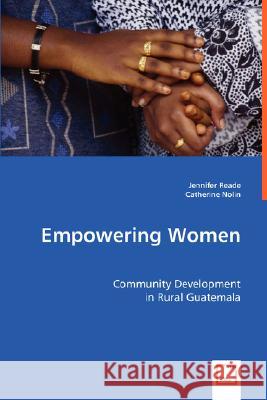Empowering Women: Community Development in Rural Guatemala » książka
Empowering Women: Community Development in Rural Guatemala
ISBN-13: 9783639004052 / Angielski / Miękka / 2008 / 156 str.
Gender is central to the organization and functioning of Guatemalan society. In many Guatemalan communities, men work within the public and political domain while indigenous women's participation in rural highland commu-nities is usually identified in the context of community development. Spanish-language illiteracy, family power relations, and a machismo culture have limited or EXCLUDED the public and political participation of women. At the extreme, Guatemalan women are targeted for murder and mutilation in rural and urban areas -- a phenomenon called femicide/feminicide -- simply for being women 'out of place'. In the mainly rural department of Huehue-tenango, something else is going on. The organization Asociacion de Desarrollo Integral de las Mujeres Huehuetecas (ADIMH) is working towards the INCLUSION of women into the public domain for the betterment of their communities through literacy, education, health, and production projects. In this book, we document the struggles and successes of Huehuetenango women, Huehuetecas, as they work towards community rebuilding after the 36-year internal armed conflict. Based upon our observations we agree with the participants that women's empowerment, as a form of community development, is integral for the future of their communities.
Gender is central to the organization and functioning of Guatemalan society. In many Guatemalan communities, men work within the public and political domain while indigenous womens participation in rural highland communities is usually identified in the context of community development. Spanish-language illiteracy, family power relations, and a machismo culture have limited or EXCLUDED the public and political participation of women. At the extreme, Guatemalan women are targeted for murder and mutilation in rural and urban areas -- a phenomenon called femicide/feminicide -- simply for being women out of place. In the mainly rural department of Huehuetenango, something else is going on. The organization Asociación de Desarrollo Integral de las Mujeres Huehuetecas (ADIMH) is working towards the INCLUSION of women into the public domain for the betterment of their communities through literacy, education, health, and production projects.In this book, we document the struggles and successes of Huehuetenango women, Huehuetecas, as they work towards community rebuilding after the 36-year internal armed conflict. Based upon our observations we agree with the participants that womens empowerment, as a form of community development, is integral for the future of their communities.











